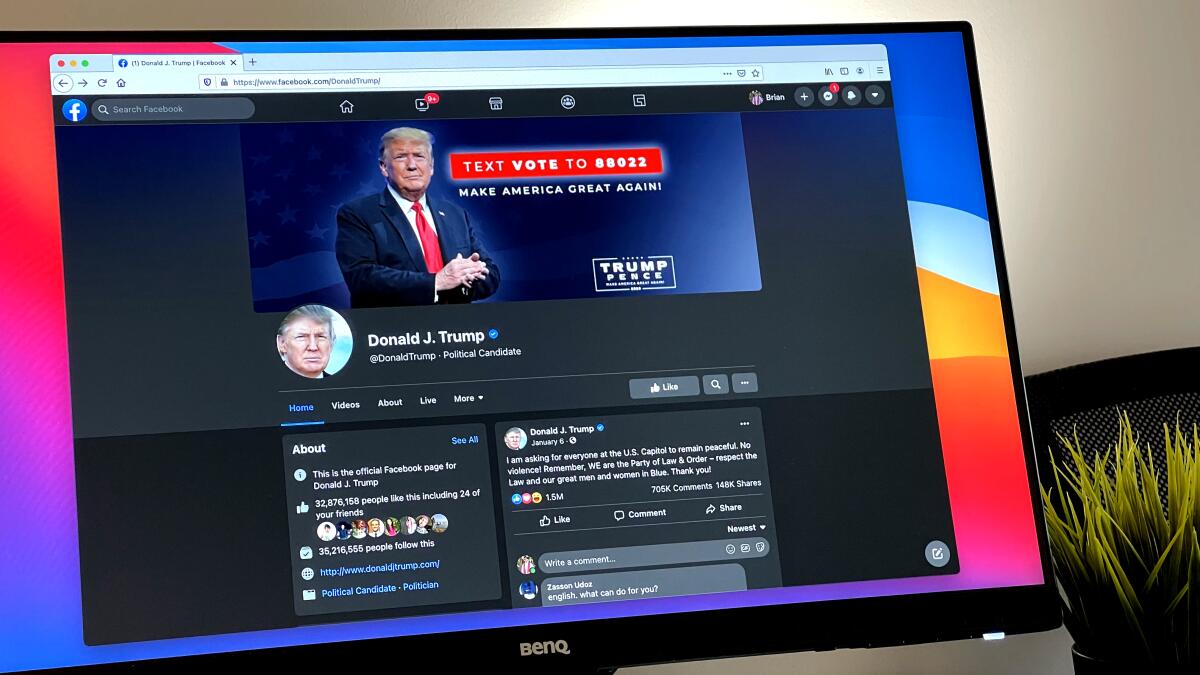Facebook’s ‘supreme court’ slaps Trump but tells Facebook to be better

- Share via
In a lengthy decision upholding Facebook’s temporary ban on former President Trump, the social network’s oversight board called out several of the company’s most aggravating traits, including its seemingly arbitrary approach to its rules, its lack of transparency and its bizarre tolerance for conduct by politicians that’s so bad it’s newsworthy. If the ruling brings about changes on those fronts, we’ll all be better for it regardless of whether Trump ultimately gets to revive his moribund Facebook page.
But the larger issue, and one that the company’s independent appeals panel didn’t tackle directly, is the raw power Facebook hands to people capable of attracting a large audience. The company’s scale and reach are in themselves a problem, given the tools the platform offers users to precisely target the people most receptive to potentially misleading and inflammatory messages.
Facebook suspended Trump indefinitely after his supporters stormed the U.S. Capitol on Jan. 6. The riot wasn’t the problem; it was Trump’s first two responses on social media, in which he praised and defended the incursion and complained yet again about the election being stolen from him. The comments were so inflammatory, Twitter banned Trump on the spot and Facebook cut him off “indefinitely.”
Facebook then asked its Oversight Board — currently a 20-member panel of academics, human rights advocates and other luminaries from around the world — to address two aspects of Trump’s suspension: Was it the right decision in light of Facebook’s “commitment to voice and safety,” and what rules should govern suspensions of accounts belonging to political leaders?
On the first question, the board said “no” — not because Trump’s statements were defensible, but because Facebook’s rules make no mention of the possibility of a suspension of indeterminate length. Instead, those rules require Facebook to set a time period for suspensions or to terminate the user’s account. In other words, the board told Facebook that it couldn’t make up responses on the fly.
Facebook has been playing catch-up with its rules ever since researchers found that the platform had been used for an aggressive disinformation campaign by Russian agents and other foreign interests in the 2016 election. But Chief Executive Mark Zuckerberg has been loath to apply those rules to politicians, who are some of the most widely followed — and thus most influential — people on the site. After Twitter belatedly started labeling Trump’s false claims in May 2020, Zuckerberg told CNBC that he didn’t think online platforms should be “arbiters of truth.”
In Zuckerberg’s framing, this is a 1st Amendment issue. But providing a microphone and an amplifier for deceit isn’t fighting the good fight for free speech. People do, in fact, have a free-speech right to lie in certain circumstances. But no one is entitled to have his or her views spread over Facebook’s vast network. It’s entirely up to Facebook to decide the rules governing who gets to use the platform it built and how they get to use it.
The board made some observations that Facebook — and Zuckerberg in particular — must heed. First, it said the free-speech rights of political figures are no greater than anyone else’s. And while the public needs to be informed, the board noted, international human rights standards — the ones Facebook says it hews to — “expect state actors to condemn violence ... and to provide accurate information to the public on matters of public interest, while also correcting misinformation.” Running for or serving in office should not be a license to broadcast lies on Facebook’s platform.
As for Trump’s suspension, the board called on the company to police its network better instead of resorting to blunt instruments like suspensions. “At a minimum, this would mean developing effective mechanisms to avoid amplifying speech that poses risks of imminent violence, discrimination, or other lawless action, where possible and proportionate, rather than banning the speech outright,” the board said.
Good luck with that. Facebook already has to employ an army of content moderators to review questionable posts, along with relying on artificial intelligence to identify problematic content before it’s widely seen. And despite all that effort, does anybody believe the platform is free from disinformation and hate speech? Its algorithms and its scale are Facebook’s own worst enemies on that front.
The board told Facebook to revisit Trump’s suspension within six months to decide whether to extend or end it. “This penalty must be based on the gravity of the violation and the prospect of future harm,” the board wrote. “It must also be consistent with Facebook’s rules for severe violations which must in turn be clear, necessary, and proportionate.”
The “clear” part has been difficult for Facebook, given the steady evolution of its rules and its occasionally ad hoc responses, as in the case here. It feeds the sense that the network’s inconsistency is grounded in self-interest, rather than the interests of users.
Trump had an enormous following on Facebook, with 35 million users subscribing to his posts there and 24 million to his offerings on its sister network Instagram. His campaign also was the biggest spender on Facebook ads, dropping more than $100 million in the 22 months leading up to the election, by ABC7 Los Angeles’ count. One can’t help but suspect that Facebook’s refusal to fact-check politicians’ ads and its “newsworthiness” loophole were based at least as much on ad-revenue ambitions as 1st Amendment ideals.
The Oversight Board added its voice to those of many Facebook critics who demand more consistency, transparency and, yes, truly principled approaches to tackling the problems on the platform. But those steps are just where the conversation starts.
More to Read
A cure for the common opinion
Get thought-provoking perspectives with our weekly newsletter.
You may occasionally receive promotional content from the Los Angeles Times.










